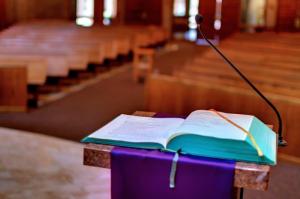The whole flailing, disastrous mess — all true, all somehow in accord with what is, and, despite itself, ably engaged in bringing our distorted grasp of things in line with that reality.
______________________________
The whole flailing, disastrous mess — all true, all somehow in accord with what is, and, despite itself, ably engaged in bringing our distorted grasp of things in line with that reality.
______________________________
When I left the Easter Saturday Mass at St. Monica’s yesterday morning, the alleluias were ringing in my ears. It had been an exhilarating way to round out the Octave, with lots enthusiastic singing and pervasive joy – alleluia indeed!
Of special note was Fr. Jacob Meyer’s resonant intoning of the Easter Sequence, Victimae paschali laudes (“Christians, Praise the Paschal Victim”) – in Latin. Since my own Latin is considerably rusty, I scrambled with a hymnal to find an English translation so I could follow along, and I couldn’t help taking note of the Sequence’s author at the bottom of the page: “ascr. to Wipo of Burgundy, d. 1048.”
Yes, that’s right, Wipo. Not exactly a household name (and neither are its variant renderings, “Wippo” and “Wigbert”), and I admit I did a big double take the first time I spied it. Nonetheless, you’ll find it in every hymnal’s fine print, although it’s usually hedged a bit with that appended “ascribed to” disclaimer – something that accompanies a lot of ancient attributions. However, the ascription is strong enough that it was repeated three times in the St. Monica hymnal’s index in conjunction with three different settings of the work.
Born around the year 1000, Wipo was ordained a priest, and then he served as a chaplain for the Holy Roman Emperor Conrad II. Wipo also wrote poetry and apothegms, and he authored several works of history and biography that are respected for their stylistic panache and relative objectivity. But, as far as ecclesial matters are concerned, Wipo is just a tentative footnote in our modern hymnals. Neither a pope nor a bishop; not a saint nor a Doctor of the Church; just Wipo – or Wippo, or Wigbert – who may have penned a great Paschal poem that was eventually incorporated into our Sacramentary and Eastertide observances.
In other words, a liturgical one-hit wonder.
And, yet, what a wonder it is. “One of the finest of the transitional Sequences,” according to Sr. J. Isaac Jogues Rousseau, SSND. We all heard Wipo’s masterpiece on Easter Sunday, when it’s obligatory every year, and maybe you’ve been hearing it (or singing it yourself) throughout the week at daily Mass. Like other Sequences, it precedes the proclamation of the day’s Gospel, and it’s an extra, especially jubilant recapitulation of the festival’s core themes – in this case, the Paschal feast’s good news of redemption through Jesus Christ, our resurrected savior.
About halfway through, it declares, “O Mary, come and say what you saw at break of day” – the ideal lead-in to yesterday’s Gospel wherein Mary Magdalene reports to the skeptical Apostles her encounter with the risen Christ. The Eleven likewise balk at a similar testimony from the two Emmaus disciples, and so Jesus finally confronts them in person – no denying the Resurrection at that point! After upbraiding the Apostles for their unbelief, Jesus repeats to them what he’d told Mary: “Go into the whole world and proclaim the Gospel to every creature” (Mk 16.15).
That’s the same commission we heard at the end of the Sequence: “Share the good news, sing joyfully: his death is victory!” Wipo’s Easter poem jubilantly sums up the essence of what we’ve been celebrating throughout the Octave – what we’re living, in fact, as contemporary witnesses to our own transforming encounters with the risen Lord.
And, following Wipo’s lead, those encounters are worth rhapsodizing about, in word and deed. May we do so with flair and delight throughout the sequence of all our days, and may a Wipo-like obscurity attend our efforts that humility be preserved. For even if, with God’s grace, we end up accomplishing great things in temporal terms, it’ll be in our interests if “ascr. to” appends to our names, both now and forever. “Our Christian destiny is, in fact, a great one,” writes Thomas Merton, “but we cannot achieve greatness unless we lose all interest in being great.”
Amen. Al-le-lu-ia.
___________________________
A version of this meditation appeared on Catholic Exchange.
“Frequent Communion is not magic.”
~ Dom Hubert van Zeller
____________________________________
“We give you thanks, Heavenly Father,
for the honor of assisting at this Holy Sacrifice….”
~ Bishop Joseph Crowley
________________________________
God, religion, was the farthest thing from our minds and talk – from mine at least. Except for one of us, a fellow who got up every morning at the crack of dawn and went to Mass. He said nothing about it and seemed otherwise normal.
~ Walker Percy
________________________
Songwriters put notes on paper.
That’s not music. You make the music.
~ Guitarist Tommy Tedesco of The Wrecking Crew
Let’s say dreams come true, and I get to see Van Morrison in concert somewhere, somehow, some day. Aw, man,  it would be so great – a once in a lifetime opportunity! I doubt I’d sleep the night before, and I’d be checking on my ticket every hour or so – to see if it was still there, still real.
it would be so great – a once in a lifetime opportunity! I doubt I’d sleep the night before, and I’d be checking on my ticket every hour or so – to see if it was still there, still real.
Then, the moment would arrive: I’m there in the audience, the instruments are tuning; the microphones are getting the “check, check, one, two” treatment – and it begins. Van kicks off the first song…
…and I drop my eyes to some wireless gadget in my lap, Google the lyrics, and read along as Van is singing on stage.
Right? Noooo, of course not! I’d soak it all in – a total immersion, listening to and watching a great songwriter give voice to his own compositions, himself, in person! They’re songs I mostly know already by heart anyway, but even if I didn’t, why would I waste that exquisite privilege by reading along?
That’s what I think of when I go to church and see folks with their noses in the missalettes – those little booklets in the pew that contain all the readings and parts of the Mass. Worse still is when their eyes are glued to iPhones or other gadgets as they follow along on apps while the lector drones on pointlessly up front.
It’s like every college student’s worst nightmare: A professor that flashes one PowerPoint slide after another, reading them word for word. Then, as if to purposely add insult to injury, he’ll sometimes pass out lecture notes with the slides already on them. Torture.
“The readings from the Word of God are to be listened to reverently by everyone,” the General Instruction explains, “for they are an element of the greatest importance in the Liturgy.” Catch that? Listened to, not scanned, not perused. In the liturgy, the Word of God is meant to be uttered and received. Here’s more from the General Instruction:
When the Sacred Scriptures are read in the Church, God himself speaks to his people, and Christ, present in his word, proclaims the Gospel.
The lector thus becom es another alter Christus, parallel to the priest who will confect the Eucharist and give us Jesus to eat. Dei Verbum makes this parallel quite explicit by insisting that in the Mass, the Church “unceasingly receives and offers to the faithful the bread of life from the table both of God’s word and of Christ’s body.”
es another alter Christus, parallel to the priest who will confect the Eucharist and give us Jesus to eat. Dei Verbum makes this parallel quite explicit by insisting that in the Mass, the Church “unceasingly receives and offers to the faithful the bread of life from the table both of God’s word and of Christ’s body.”
So the lector’s job really is a vital one, but we treat it as if it were purely functional – a task that is required by the rubrics, yet largely irrelevant since we have the text so readily available, usually right there in the pew. “A reading from the First Letter of…,” the lector begins, which ought to put us on the edge of our seats. It’s Christ himself, after all, announcing his Word – the Logos, his very divine Self, enunciated for us, for me!
And yet, what’s our typical response? “Ho-hum (*yawn*), maybe I’ll grab the missalette and read along.”
That’s wacko.
Don’t get me wrong: Reading Scripture for ourselves isn’t bad, and the Church has never asserted anything even close to that – despite the lingering anti-Catholic canard to the contrary. Indeed, there’s no question Gutenberg did all of Christendom a huge favor by inventing the printing press and making the Bible easily and universally obtainable. Yet personal Bible reading ought to be reserved to times outside of Mass, and particularly around Mass – like, for example, a family coming together to read the Gospel before church, or reflecting on it at home afterwards.
press and making the Bible easily and universally obtainable. Yet personal Bible reading ought to be reserved to times outside of Mass, and particularly around Mass – like, for example, a family coming together to read the Gospel before church, or reflecting on it at home afterwards.
When we’re at Mass, however, we should skip the missalette altogether lest we fall into what is essentially a Protestant approach to the Liturgy of the Word. In keeping with the Reformation precept that everyone should interpret the Bible for himself, many Protestants bring their own Bibles to church and read along as the Scriptures are read. It’s as if they’re checking up on the reader’s accuracy and precision – almost like rabbis peering over the shoulder of a young boy reading the Torah at his bar mitzvah. But if we’re reading, we’re not really listening, and the Liturgy of the Word becomes just another cerebral exercise instead of an incarnated, holistic epiphany.
Sacred Scripture was meant to be received aurally in the liturgy, in the same way that classic iconography depicts the Blessed Mother receiving the Word of Go d via a dove entering her ear. In fact, we call that blessed event the Annunciation because it was St. Gabriel’s “announcement” that itself realized the miracle of Jesus’ virginal conception. “Come and gaze upon this marvelous feat,” St. Athanasius attests, “the woman conceives through the hearing of her ears!” We’re called to do the same during the readings at Mass: To imitate Our Lady in receiving the Lord through hearing a proclamation, much as her cousin Elizabeth “received” an encounter with Jesus the moment she heard Mary’s greeting at the Visitation.
d via a dove entering her ear. In fact, we call that blessed event the Annunciation because it was St. Gabriel’s “announcement” that itself realized the miracle of Jesus’ virginal conception. “Come and gaze upon this marvelous feat,” St. Athanasius attests, “the woman conceives through the hearing of her ears!” We’re called to do the same during the readings at Mass: To imitate Our Lady in receiving the Lord through hearing a proclamation, much as her cousin Elizabeth “received” an encounter with Jesus the moment she heard Mary’s greeting at the Visitation.
And the missalettes? Should we ditch them outright? I wouldn’t go that far, for there are circumstances when they do come in handy – and are even necessary. For instance, those who are hearing impaired have to rely on missalettes when there are no sign language interpreters or amplification devices available. Plus, let’s face it, sometimes it’s not easy to understand certain lectors, even if you want to. I know for myself that if I’m up front reading, and I see folks reaching for their missalettes, I automatically assume that I’m doing a lousy job – that my “proclamation” is not “audible and intelligible” as the Catechism says it should be.
Still, I probably shouldn’t be so hard on myself, because I know that many of us grab the missalette and open it up out of habit, regardless of how good the lector is. What I’m suggesting, I suppose, is that we should break that habit, and experience the Liturgy of the Word as it was me ant to be experienced: Through our ears.
ant to be experienced: Through our ears.
Think of it this way: When you go to your local library branch with an armful of books and videos to return, do you ever hip-bump the blue handicapped button and wait for the door to open automatically – even though you’re not handicapped? I know I do, and that’s not so bad, right? But here’s the bad part: It’s now a habit for me, even when I don’t have an armful of books. Yup, it’s true, I’ll whack that blue button out of sheer laziness, especially if I have a contingent of kids with me. What ought to be an extraordinary, occasional use of an assistive device has become ordinary and routine.
This Lent, why not add to your fasting regimen by abstaining from missalette use completely and trust your lectors to convey the Word of God to you. By the time Easter rolls around, I’m guessing you won’t go back, for you’ll have discovered how much more you can get out of Mass when you truly “hear, contemplate, and do in the celebration” (CCC 1101).
_________________________________
“Be present at the sacred and divine liturgy,
conclude its prayer
and do not leave before the dismissal.”
~ from an ancient Greek sermon
“Do not neglect the gift you have.”
~ St. Paul
Our skills lab for nursing fundamentals starts at 7:00 a.m., and so students frequently have trouble staying awake during our tedious PowerPoints and videos. We try to keep them engaged – regaling the students with hilarious anecdotes from our own years as staff nurses, for example – but there’s only so much you can do to make things like bed baths and body mechanics interesting.
 Nobody sleeps on injections day however. Eyes are open wide; attention is rapt. “This is important,” their demeanor suggests. “We’re learning to give shots.”
Nobody sleeps on injections day however. Eyes are open wide; attention is rapt. “This is important,” their demeanor suggests. “We’re learning to give shots.”
They’re right – it is important. Of course, we think that everything we teach our beginning nursing students is important, yet there’s no denying that shots are different. Not only does it involve the administration of potent medications – important enough in itself – giving shots also involves jabbing strangers with sharp objects.
The surprising thing, however, is that the teaching part isn’t all that difficult – in fact, it’s actually a lot of fun. Each new detail is like a revelation to the students, and we nursing instructors get a kick out of seeing their reactions. We put syringes and needles in their hands – wonder of wonders! The students watch us demonstrate proper technique by administering injections to manikins – fascinating!
And then the moment comes they’ve all been waiting for: Stabbing a needle into a vial of fluid, drawing up a mock dose of medication into a syringe, and giving that first shot – into an injection pad, granted, but still an honest-to-goodness shot!
It’s all very Montessori-esque and kinesthetic, as the learning unfolds manually, hands on, and not solely by way of abstract whys and wherefores. After the students’ initial lab experience, they will practice – lots of practice, on the manikins and injection pads, and maybe oranges and hot dogs – and they will make the skill their own. Eventually, each student will provide a return demonstration (on a manikin), and only those students who perform the skill safely will be permitted to attempt a real injection on a real patient.
Frankly, that’s when the true challenge comes for the nursing instructor. Teaching shots in the lab is one thing; coaching students to give actual shots to people they’ve just met is quite another.
We’re teaching injections right now at my school of nursing, so all this stuff was in the back of mind when I was at Mass the other day and our assistant pastor reminded us that he’d only been ordained for a year. Thus, a little more than a year ago, Father would’ve still been in the seminary chapel, practicing the Eucharistic Canon as a transitional deacon, and anticipating his first real Mass on ordination day. It got me thinking: What an exciting and strange thing it must be to teach men to say Mass . What an exalted privilege. And lots of fun to boot – probably one of the best parts of teaching future priests.
. What an exalted privilege. And lots of fun to boot – probably one of the best parts of teaching future priests.
Sure, seminaries have to instruct men how to preach and teach, how to counsel and collaborate, and how to run a parish – the Code of Canon Law demands as much, and it’s what you’d expect. But lay people and deacons receive formation in such matters as well, and they often carry out those duties as a part of their ministries. What sets priestly formation apart, among other things, are those dimensions that are specifically geared to the “sacred power (sacra potestas)” conferred at ordination – which, for the priest, includes especially the power to confect the Eucharist. The power, that is, to make God.
For that’s what the word “confect” means – to put something together. In the case of the Mass, it’s the priest putting together bread and wine, along with his spoken words and intention, and, voila!, there’s God himself on the altar! It’s a miracle every time, regardless of how routine it might become for us – or even for the priest. And that’s where I was thinking the parallels between teaching nurses and teaching priests are particularly noteworthy.
I mean, I was already picking up on a correlation in the instruction arena – both groups of educators guiding their respective students in the mechanics of future privileged duties, and delighting in their charges’ anticipation of the day they themselves would be able to fulfill those duties. Moreover, there are additional similarities with regards to the interior preparation naturally accompanying such practical instruction – instilling in our students the attitudes and dispositions that will facilitate a lifetime of service to the people entrusted to their care.
Finally, there’s also a parallel with regards to the day – for the nursing student, the first real shot; the priest, the first real Mass. No more pretending in the lab or seminary; no more dry runs and rehearsals. This is it – the time has come. The new priests will surely have rattled nerves considering what they’re about to undertake. Do seminary instructors have to coach their students at that point like I do mine? Urging them to project a confidence they don’t possess yet, relying instead on our confidence in them?
But that’s about it with regards to the analogies, I’m afraid, for there’s no comparing the actual tasks at hand. Giving a shot correctly and well – even the first time – is imperative for the recipient and the student nurse alike, and for obvious reasons. But saying Mass? Calling down the host of heaven, and traversing millennia  to drag into the present Calvary’s awful paradox; holding up created matter, and commanding it to become the Creator himself – this is what the priest does, even that very first time he stumbles and falters his way through the Eucharistic Prayer.
to drag into the present Calvary’s awful paradox; holding up created matter, and commanding it to become the Creator himself – this is what the priest does, even that very first time he stumbles and falters his way through the Eucharistic Prayer.
And he’ll be doing it again and again, probably daily, and for the rest of his life. I know nurses can lose touch with the passion for care and service that drove them to nursing school in the first place, and we have to actively guard against that. Do priests have to do the same? Can they forget, in other words, their first love?
Pope John Paul II thought so, which is evident in his apostolic exhortation on priestly formation, Pastores Dabo Vobis. “Live the mystery that has been placed in your hands,” St. John Paul wrote, calling to mind the charge given priests in the Rite of Ordination, “when the offerings of the holy people for the eucharistic sacrifice are placed in his hands.” That mystery is the Lord Jesus himself, of course, who is the source and summit of the Christian life, and whom the priest is directed to enflesh in a particular and irreplaceable way through his life and ministry. The Pope continued:
For this to be so, there is need for great vigilance and lively awareness. Once again, the Rite of Ordination introduces these words with this recommendation: “Beware of what you will be doing.”
“Beware,” the Rite warns – these are dire matters indeed.
Please join me in praying for our priests. We all require the medicine God provides us through their hands; they, in turn, deserve our unflagging support and gratitude.
_______________________________________________
A version of this story appeared on Catholic Exchange.
If a thing is worth doing, it is worth doing badly.
~ G.K. Chesterton
My high school choir director couldn’t have been more emphatic. “Whatever you do, whatever happens, no matter whatever else you do wrong,” he told us before we left for Europe, “don’t lose your passport!”
Needless to say, I did.
I made it through four countries without a hitch, stashing my passport in my hotel room after check-in, and retrieving it before departure. When we hit Brighton, England, however, I got a bit too clever. I hid my passport so well that I couldn’t find it several days later before leaving for London. As a result, I spent a whole day at the U.S. Embassy filling out forms and being grilled by officials while my compatriots toured Buckingham Palace and Westminster Abbey. Bummer.
On the plus side, however, I got to hang out at the U.S. Embassy—something my Palace and Abbey visiting friends missed out on completely. The Embassy was a fairly boring encounter in itself, to be frank, but being in that physical space—inside the Embassy, on American turf within the confines of a foreign country—was unexpectedly solemn and comforting. There, I was home, although not home. There I was safe and could get the help I needed to continue my journey home.
safe and could get the help I needed to continue my journey home.
I have similar feelings when I go to Mass every day. It’s like I’m slipping into God’s embassy for a respite from the jarring and disorienting journey of my daily jumble of life.
Hilaire Belloc touches on this in The Path to Rome, where he talks of daily Mass as a source of both spiritual and temporal goods.
Of course there is a grace and influence belonging to such a custom, but it is not of that I am speaking but of the pleasing sensation of order and accomplishment which attaches to a day one has opened by Mass.
Belloc lists four reasons that daily Mass is comforting to him—four reasons that James Schall, SJ, described as being “as profound as any seen in theological literature since.”
For example, Belloc includes the simple fact that by attending daily Mass, one is setting aside thirty minutes or so to be quiet and “recollected,” putting aside “cares, interests, and passions”—an action that “must certainly be a great benefit to the body,” says Belloc.
He also notes that Mass is a ritual, and that when you give yourself over to that ritual, it takes over and can “relieve the mind…of responsibility and initiative and…catch you up (as it were) into itself, leading your life for you during the time it lasts.”
The “most important cause of this feeling of satisfaction,” says Belloc, is that daily Mass attendance is an ancient tradition—and it wouldn’t be an ancient tradition if it wasn’t important. “Whatever is buried right into our blood from immemorial habit…we must be certain to do if we are to be fairly happy….”
But my favorite of Belloc’s four reasons is his third—Mass as an escape and a refuge.
3. That the surroundings incline you to good and reasonable thoughts…. Thus the time spent at Mass is like a short
repose in a deep and well-built library, into which no sounds come and where you feel yourself secure against the outer world.
Note that he says that the surroundings themselves incline you such, and that the “time spent at Mass” is itself the repose, regardless of your attentiveness or even interior disposition. In other words, taking all his four causes together, Belloc is suggesting that the mere act of getting to Mass has value, even infinite value.
Now in the morning Mass you do all that the race needs to do and has done for all these ages where religion was concerned…and all that your nature cries out for in the matter of worship.
This is vitally important, especially to a slug like me. I am not always properly disposed or attentive at Mass—a truism that might be lost on those who don’t make Mass a daily priority. Those of us who do make it a priority know that it’s certainly not because we’re particularly holy, or anywhere close to it. In fact, the opposite is the case: We know we’re lousy sinners, and we want to be holy. Getting to daily Mass is just the lazy man’s approach to the matter.
Lazy man’s approach because, as Belloc was suggesting, all you have to do is show up to accrue some benefit. I even confessed this once—that my practice of going to Mass every day seemed like spiritual sloth because it was just too easy. Shouldn’t I be doing more than that? My confessor laughed and pointed out the pride in my question. “Just being at Mass is of infinite value, regardless of your state of mind,” he said. “Remember that Jesus is the one who is the real Actor there. You never know how He’ll be able to get through to you, but it’s up to you to get yourself into the pew.”
Romano Guardini writes about this in his Meditations Before Mass:
At the celebration of the Lord’s memorial we are not dependent on our own faculties of perceiving and appreciating; Christ works with us. Primarily it is He who acts; in our “remembering,” it is Christ Himself who stirs.
On the other hand, Guardini also speaks of a “veritable crisis of boredom and weariness” when Mass becomes just routine.
When the Mass threatens to become a habit for someone who goes regularly during the week, it is certainly advisable for him to attend less frequently, perhaps only on Sundays for a while, substituting visits in the quiet church or Bible reading.
Gulp—is that me? I must confess that I’m frequently distracted at daily Mass, or even so fatigued that I routinely fall asleep (hopefully during the homily). Yet, even then, isn’t there greater value in getting to Mass than simply making a visit or reading my Bible? If I make it inside the door, and I’m present for the miracle that takes place there, isn’t that always preferable to virtually everything else?
My confessor and Belloc would argue in the affirmative, I think, and perhaps even the Holy Father.
In his recently published interview, Pope Francis referred to the Church in medical terms:
I see the church as a field hospital after battle. It is useless to ask a seriously injured person if he has high cholesterol and about the level of his blood sugars! You have to heal his wounds. Then we can talk about everything else. Heal the wounds, heal the wounds…. And you have to start from the ground up.
 What a terrific image of daily Mass! When I get my sorry self into the pew for Mass every day—despite the distractions and fatigue, and regardless of how attentive or disposed I am—I’m a wounded warrior that needs first aid and basic care before returning to the battle. Yes, I need to strengthen my prayer life outside of Mass, and, yes, I need to say my Rosary and find time for spiritual reading.
What a terrific image of daily Mass! When I get my sorry self into the pew for Mass every day—despite the distractions and fatigue, and regardless of how attentive or disposed I am—I’m a wounded warrior that needs first aid and basic care before returning to the battle. Yes, I need to strengthen my prayer life outside of Mass, and, yes, I need to say my Rosary and find time for spiritual reading.
But for the moment—a spiritual expatriate in need of assistance, a limping combatant requiring balm—just being there is enough. And I’ll be back again tomorrow, please God.
_____________________________________________________
A version of this story appeared on The Catholic Thing.